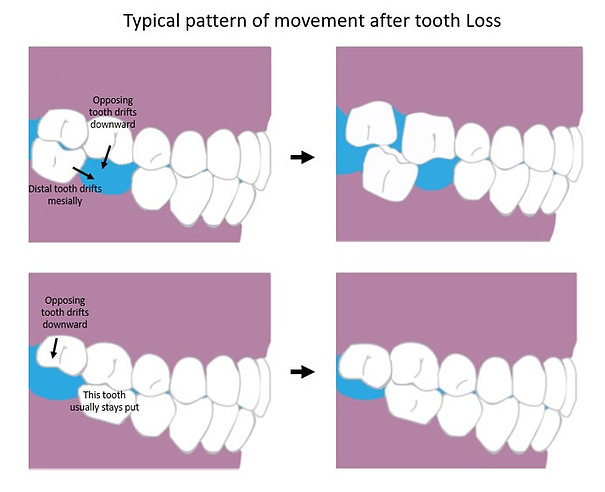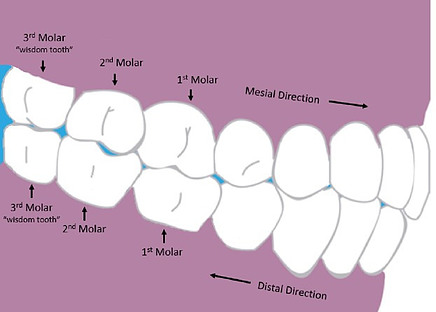I’ve learned over the years that people respond very differently to a missing tooth. Some people cannot tolerate the chewing difficulty and/or aesthetic change imposed by the empty space, whereas others don’t miss their tooth at all. They have no problems eating whatever they want.
There are pros and cons to everything. If you lose a tooth, nearby teeth will indeed shift, and this shifting could create annoying food traps and make good home care more difficult.
However, if you lose your very last molar, movement is less of a concern. Its next-door neighbor will probably not move back towards the empty space. That is because teeth tend to move in the “mesial” direction, which means toward the right/left midline.
They do not tend to move “distally,” or away from the midline. The opposing tooth (the old chewing partner of the missing tooth) may start to drift towards the empty space especially if a lower tooth was removed.

When Replacing a Tooth is Not Necessary
- The missing the tooth does not bother you. The empty space is not aesthetically objectionable to you, you chew comfortably, and you can eat whatever you want.
- You have good home care, and see your hygienist regularly.
- Your level of tooth wear is normal for your age. You do not clench or grind.
Heavy Wear Patients – Clenchers and Grinders
For those patients who have excessive wear for their age, I like to replace their missing tooth. Those folks need more support to handle the forces on their dentition. The wear typically comes from clenching and grinding. Wearing a bite guard regularly will alleviate some of these concerns.
If I trusted that my clenching and grinding patients would be fully compliant with a bite guard, then I would be comfortable forgoing a single tooth replacement. I am a huge advocate of bite guards! In my experience, though, many patients have a hard time remaining consistent with and wearing their bite guards every night.
However, if you know that you really are the compliant-type, then it might make sense to put your dental dollar into a good night guard rather than a large investment to replace just one tooth.
They bite guard is typically far less expensive than replacing a tooth with a bridge or implant and it will protect all of your remaining teeth.
What If You’re Missing Multiple Teeth?
Multiple missing teeth is an even bigger problem for heavy wear patients. Clenchers and grinders with too many missing teeth will accelerate the destruction of their remaining teeth.
Think of an 18-wheeler truck. The truck needs all of those tires to absorb the wear and tear. The same is true of the dentition of clenchers and grinders. With many missing teeth, those that remain are taking too much pressure. They often become mobile and are more susceptible to periodontal infection.
When teeth are moving around, it creates an opportunity for plaque and bacteria to sneak into the areas between the teeth and the gums. Again, strict compliance with a bite guard may mitigate these issues. But I would still strive to get most of the missing teeth replaced one way or another.
On the other hand, patients who show very light wear on their teeth will often function just fine even with multiple missing teeth. Studies have shown that they can manage even if they’re missing all of their molars. Chewing may be more difficult, but if they don’t want to invest in replacing missing teeth, they usually adapt to the changes and learn to eat just fine.
What I Recommend for My Patients

2nd and 3rd Molars:
Unless my patient shows signs of heavy wear, I rarely advocate replacing second or third molars. It would require a big financial investment for a tooth that most people hardly notice is missing.
1st Molar or Mesial:
On the other hand, if my patient is missing a first molar or any tooth mesial (towards the midline) to their first molar, I encourage them to replace it even if they are not a clencher or grinder. A dental implant and crown is my preferred way to replace a single tooth.
Most people are bothered by the difficulty chewing and/or aesthetic changes caused by the missing tooth. And, over the years, they will lose bone where their tooth used to be. If there is too much bone loss, dental implants may no longer be an option. So, it’s usually better to get an implant placed within a couple of years after losing the tooth.
That said, I don’t force the issue of replacing a missing tooth no matter where it is. Many people are missing a first molar, a premolar or even a canine, or incisor, and they are doing just fine – thank you very much!
The real-world truth – millions and millions of people are missing a tooth and they never replace it! Yes, their remaining teeth shift into a new equilibrium, but they still manage to keep everything clean, and suffer no major consequence. They live long and happy lives sans tooth!
I hope that offers a little perspective to help you make the decision that is right for you. If you would like to replace your missing tooth, and want to understand your options, click here!
If you have any questions or insights, please feel free to comment below!


Good information. This really helps my decision on whether or not I should replace that missing molar. Thanks!
Thank you! Glad to hear it helps!
I enjoyed reading your comments. There were so many medicine changes when I first developed fibromyalgia that the enamel on my teeth became compromised. which left my teeth weak I had two silver crowns on a molar on each side of my mouth. I ended up losing those molars. It would have been a large amount of money to replace them. It does not affect the chewing process or oral hygiene so I did nothing to replace them. Thank you for the information I often wondered if I did the wrong thing. Hope your page will help others.
I feel as if you have seconded my decision.
Thank you, Gail! I’m sorry that you have fibromyalgia. I know that can be a very painful condition. I’m glad I helped you make peace with your decision not to replace your missing molars. 🙂
This is a very helpful post on whether one needs to replace a missing tooth or not. I am currently having problems with my one molar after a piece of tooth broke off. It already had root canal work done on it, and my feeling was that maybe the tooth should just be extracted.
But after reading your advise, I think the tooth needs to be fixed if possible, or replaced, as it looks as if it is the first molar. I will now be better prepared when I discuss the options with my dentist.
Thank you. I’m not sure what is going on with your molar, but if a piece broke off and it can be repaired with a crown, I would not extract it. I would do the crown. I would only extract a tooth under two conditions:
1.) it would otherwise need a root canal, and the patient does not want the root canal,
2.) it is not restorable. (a.k.a. unfixable) Meaning – it’s broken down to the point where it is vulnerable to developing an infection and there is nothing we can do to repair it. Typically that’s because the defects are so extensive and often extend under the gums, into the root.
Good luck! I hope that helps! 🙂
I never knew there was an equilibrium shift because of my missing tooth. My dentist has always wanted me to replace it, but I have always dragged it back. He suggested that the dental implant would be good for me, but I always feel at my age, it is not necessary. But with your advice, I will go for the dental implant to bring an end to my slight difficulty in chewing
Thank you for sharing your experience. It sounds like either choice would be reasonable in your case. It probably depends on how much it costs to replace it and how much it bothers you to chew without it!